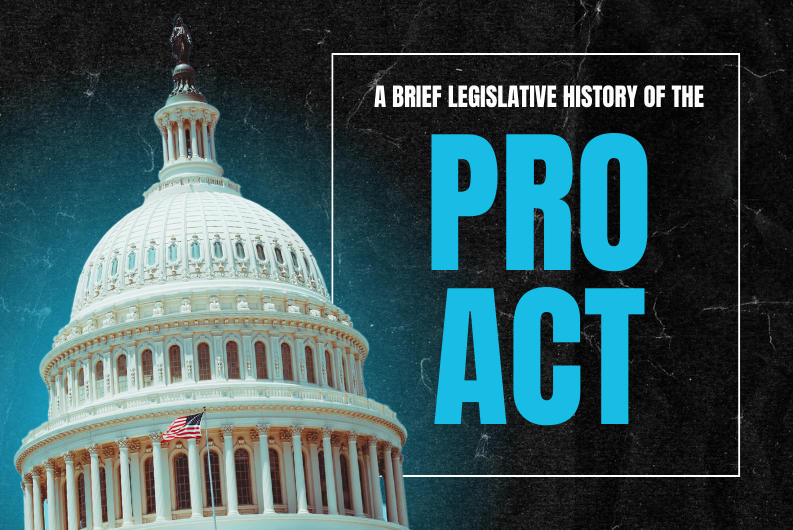The Protect the Right to Organize (PRO) Act seeks to strengthen the rights of workers to organize, bargain collectively, and engage in other concerted activities to improve their wages, benefits, and working conditions. The legislation was first introduced in Congress in May 2019 by Representative Bobby Scott (D-VA) and Senator Patty Murray (D-WA) and has received support from a broad range of labor unions, progressive groups, and worker advocates.
The original version of the PRO Act included several provisions aimed at protecting workers’ rights, including:
- Prohibiting employers from interfering with employees’ rights to form and join a union, including through coercive or threatening behavior.
- Strengthening workers’ ability to engage in strikes, boycotts, and other forms of collective action.
- Requiring employers to bargain in good faith with their employees’ chosen representative.
- Protecting workers from retaliation for engaging in union activities.
- Establishing new penalties for employers who violate workers’ rights.
- Strengthening workers’ ability to bring claims of unfair labor practices before the National Labor Relations Board (NLRB).
Despite objections and opposition from some Republicans and the business community who argued that the bill would undermine employers’ ability to run their businesses and would lead to more labor disputes and work stoppages, the PRO Act passed the House of Representatives in February 2020 by a vote of 224-194, with support from all but one Democrat and five Republicans. However, the bill did not advance in the Republican-controlled Senate.
After the 2020 election, the balance of power in the Senate shifted, giving Democrats control of the chamber. In March 2021, the PRO Act was reintroduced in both the House and Senate. The new version of the bill included many of the same provisions as the original but also included additional measures to protect workers’ rights.
Some of the key changes in the new version of the PRO Act includes the following:
- Expanding workers’ rights to engage in secondary boycotts and other solidarity actions.
- Strengthening workers’ ability to negotiate for higher wages and better benefits.
- Prohibiting employers from misclassifying employees as independent contractors to avoid paying overtime and other benefits.
- Protecting workers’ rights to bring class-action lawsuits against their employers.
- Strengthening penalties for employers who retaliate against workers for engaging in union activities.
- Providing additional funding for the NLRB and other agencies enforcing workers’ rights
The new version of the PRO Act was once again passed by the House of Representatives in March 2021 by a vote of 225-206, with support from all but one Democrat and no Republicans. The lone Democrat who did not vote for the PRO Act was Representative Terri Sewell of Alabama. However, it is worth noting that Sewell had co-sponsored the original version of the PRO Act in 2019 and had expressed support for the bill’s goals of protecting workers’ rights to unionize and bargain collectively. Her decision to vote against the bill in 2021 may have been influenced by concerns about the bill’s potential impact on small businesses in her district or other factors unrelated to the bill’s core provisions. Nonetheless, the bill still faces an uphill battle in the Senate, where it will need the support of at least 10 Republicans to overcome a potential filibuster.
The bill has widespread support among the American public because of the major impact it could have on workers’ rights and economic inequality. Indeed, the PRO Act addresses several longstanding issues that have hampered the ability of workers to exercise their rights under the National Labor Relations Act (NLRA), passed in 1935, and remains the primary federal law governing collective bargaining and unionization in the private sector.
The PRO Act benefits workers by:
- Eliminating so-called “right-to-work” laws, which weaken unions by reducing their financial resources and making it more difficult for them to negotiate favorable contracts on behalf of their members.
- Prohibiting employers from holding mandatory anti-union meetings, also called captive-audience meetings, requiring workers to sign so-called “neutrality agreements” that prevent them from discussing unionization or retaliating against workers who engage in union activities.
- Streamlining the union election process and requiring employers to provide workers with access to contact information for their coworkers, making it easier for workers to form unions.
- Allowing workers to organize “micro-unions” – smaller bargaining units within a larger workplace – which could help to address issues that are specific to certain departments or job classifications.
- Preventing employers from misclassifying workers as independent contractors in order to avoid paying benefits and other obligations.
- Requiring employers to provide advanced notice before conducting a mass layoff or closure, providing workers with more time to prepare for potential job loss.
- Establishing penalties designed to discourage employers from engaging in unfair labor practices and to ensure that workers’ right to unionize and engage in other concerted activities is protected. For example:
- Employers who violate the provisions of the PRO Act may be subject to civil penalties, including fines of up to $50,000 per violation.
- Injunctive relief: The PRO Act allows workers or their unions to seek injunctive relief in federal court to prevent or remedy any unfair labor practices committed by their employer.
- Liability for damages: Employers who violate workers’ rights may be held liable for damages employees suffer due to the violation, including back pay, reinstatement, and other compensatory damages.
- Criminal penalties: In some cases, employers who violate workers’ rights may be subject to criminal penalties, including fines and imprisonment.
- Protecting workers’ rights to engage in other concerted activities to improve their wages, benefits, and working conditions.
Despite the protections afforded by the NLRA, unionization rates in the private sector have been steadily declining for decades, with just 6 % of private sector workers currently belonging to a union. This decline has been partly driven by the rise of “right-to-work” laws, which have made it more difficult for unions to organize and sustain themselves financially. The PRO Act represents a critical step forward in the fight for economic justice and equity and can help to improve the lives of millions of workers across the country by strengthening the ability of workers to organize and bargain collectively.




